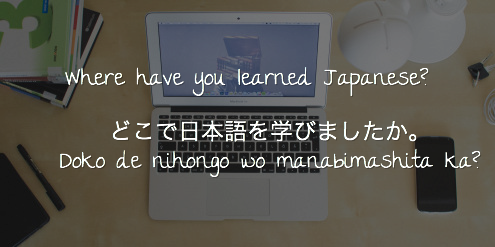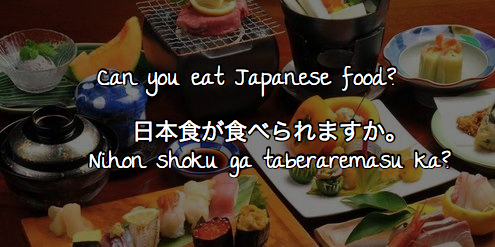Knowing Japanese questions (and phrases) is important to speaking and understanding Japanese. Why?
- You’ll be asked questions.
- You’ll need answers.
- You’ll ask questions too.
- And you’ll be speaking more Japanese.
So here are the top 10 Japanese questions, really common ones, that you should know. About you. About your family, your preferences and more. You use them in English all the time. You should know them in Japanese too.
Remember. 1) There are no question marks in standard writing. Thus, “か” or “Ka” ending imply that the sentence is a question. 2) In speech, the “Ka” can be dropped to turn the question into a very casual one.
✅ And hey, if you want to learn & speak Japanese with a complete learning system, (2,000+ audio/video courses, apps, study tools and more) Sign up at JapanesePod101 (click here) and start learning! I recommend ’em as a teacher & learner.
1. Asking “What’s your name?” in Japanese
- 名前は何ですか。
- Namae wa nan desu ka?

Extremely easy to remember. Namae is name. Namae name. Name namae. Get it? Ridiculously close to each other. Feel free to use it on any Japanese person you meet. You can answer with:
| #1. Super Polite | #2. Polite/Normal | #3. Casual |
| (name) と申します。 | 私は (name) です。 | (name) です。 |
| (name) to moushimasu. | Watashi wa (name) desu. | (name) desu. |
| I am (name). | I am (name). | I’m (name). |
Mostly stick to #2, or #3 if you’re with friends. #1 is used by people that address you as a customer (such as delivery people, doctors, etc.) and other formal settings like in a job interview.
2. Where are you from?
- 出身はどこですか。
- Shusshin wa doko desu ka?

Shusshin means origin, so it doesn’t exactly mean “where are you from?” Remember, Japanese isn’t directly translatable at times. However, that’s the meaning of it. You can easily answer with…
- 出身は (country)。Shusshin wa (country).
- I’m from (my origin is) (country).
- (country)からきました。(country) kara kimashita.
- I came from (country).
- (nationality)です。(nationality) desu.
- I am (nationality).
3. Where do you live?
- どこに住んでいますか。
- Doko ni sunde imasu ka?

Very basic question and good to know. And if you already live in Japan, Japanese people will ask you this. Each area has something unique about that that they can comment on. This will lead to more conversations.
You can answer with country, city, neighborhood, etc. depending on the context. Easy answer is…
- (Location) に住んでいます。
- (Location) ni sundeimasu.
- I live in (Location).
4. What’s your job (occupation)?
- 仕事は何ですか。
- Shigoto wa nan desu ka?

Again, a very common question (I mean, isn’t it common in your country too?) so you should probably know it. If you’re a student, you can answer this question with:
- 学生です。
- Gakusei desu.
- I’m a student
So, the format of the answer is:
- (occupation/job title)です。
- I’m a (occupation/job title).
You can also say:
- (occupation)をやっています。
- (occupation) wo yatteimasu.
- I do (occupation).
5. Can you speak Japanese?
- 日本語を話せますか。
- Nihongo wo hanasemasu ka?

Keep your ears peeled for this. Just like many Japanese aren’t English speakers, many foreigners in Japan don’t speak Japanese either. So, if someone wants to talk to you, they’ll ask you this. Other variations include:
- 日本語(で/が)大丈夫ですか?
- Nihongo (de/ga) daijoubu desu ka?
- Is Japanese OK?
- Both de or ga are OK. The nuance is slightly different but the meaning is the same.
- 日本語ができますか?
- Nihongo ga dekimasu ka?
- Are you able (capable) in Japanese? Simply, they’re just asking if you CAN speak Japanese. “To speak” is omitted because it’s implied in this context.
Here are some possible answers:
- はい、はなせます。
- Hai Hanasemasu.
- Yes, I can speak.
- いいえ、あまり話せません。
- Iie, amari hanasemasen.
- No, I can’t really speak it.
- はい、大丈夫です。
- Hai, daijoubu desu.
- Yes, it’s okay (to use Japanese with me)!
- はい、できます。
- Hai, dekimasu.
- Yes, I can.
6. How long have you been studying Japanese for?
- どのくらい日本語を勉強していますか。
- Dono kurai nihongo wo benkyou shite imasu ka?

Expect this question too. Especially if you’re good. Any native speaker will want to know how long you’ve been studying their language for. I mean, if you were studying mine, I’d be interested. Some possible answers include:
- 一か月間です。
- Ikka getsu kan desu.
- For one month.
- 一年間です。
- Ichi-nen kan desu.
- For one year.
7. Where have you learned Japanese?
- どこで日本語を学びましたか。
- Doko de nihongo wo manabimashita ka?

And if you’re that good, they’ll want to know where and how you did it. Most people are self taught. Then you have those going to language schools in Japan. Either way is fine, but it’s the self taught ones that are good, that are impressive.
This is easy to answer:
- (Place) で学びました。
- (Place) de manabimashita.
- I learned at (place).
And if you’re still learning…
- (Place) で勉強してる。
- I’m studying at (place).
And if you’re learning on your own…
- 自分一人で勉強しています。
- Jibun hitori de benkyoushite imasu.
- I’m studying on my own.
- オンラインで習っています。
- Onrain de naratteimasu.
- I’m learning online.
8. Can you eat Japanese food?
- 日本食が食べられますか。
- Nihon shoku ga taberaremasu ka?

You know, allergies and such. And quite a bit of people, as shocking as it is to me, hate raw fish. Sushi is delicious! But, you’ll get this question quite a bit. Is there anything you can’t eat? Let’s answer it!
- はい、食べられます。
- Hai, taberaremasu.
- Yes, I can it it.
- いいえ、食べられません。
- Iie, taberaremasen.
- No, I can’t eat it.
- (Specific food) が食べられません。
- (Specific food) ga taberaremasen.
- I can’t eat (Specific food).
9. Do you like Japanese food?
- 日本食が好きですか。
- Nihon shoku ga suki desuka?

Well, who doesn’t? I do. Well, most of it. But again, a very common question. Bonus points if you can talk about the food that you actually don’t like!
- 好きですよ。
- Suki desu yo!
- I like it!
- あまりすきじゃないんです。
- Amari suki janaindesu.
- I don’t really like it.
- 大嫌いです。
- Daikirai desu.
- I hate it!
10. Asking “How is it?” in Japanese
- どうですか。
- Dou desu ka?

Notice there’s no subject? This question can be applied to any situation. How is it? Food. School. Test. Work. Whatever the context is, you can always ask how it is or how it went.
Given how vague, in the context of this article, this question is, you’ll need to know a good adjective to answer it. It’s simple.
- (adjective)です
- (adjective) desu.
- It’s (adjective).
And that’s it for part 1!
These are the top questions that come up in conversations. It’s best to know Japanese questions and the answers to them if you want to improve.
Did I miss any? Any questions? Want more?
Leave a comment below, share this and learn more Japanese!
– The Junkie

Japanese is more important the phrases and words still learning new things to do.
Thanks I got it, this is what Im looking for, could you show more Q&A like this, as soon possible I have to see & memorize it,
Where did you studying at education college and introduce yourself on family name? MOST OF JAPAN’S will can not great good speaking language’..,? Everything describes how does many JAPAN relations with countries other than those discussed earlier are mainly commercial and economic,/68.5% of the population of Japan are Japanese, with the remainder being foreign nationals residing in Japan.?
Question 6 is wrong. It’s not ‘benykou’ but ‘benkyou’. The picture is wrong too.
一か月間です。
Ikka getsu desu.
For one month.
>Usually it’s written as 一ヶ月
>It says ikkagetsu kan desu.
[…] to Part 2! Read part 1 here and part 2 […]
[…] Welcome to Part 2! Read part 1 here! […]